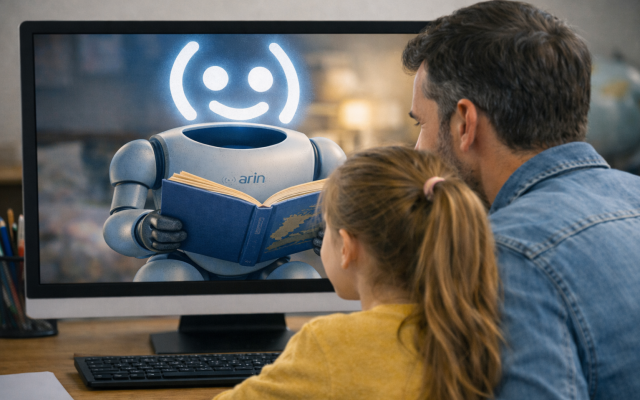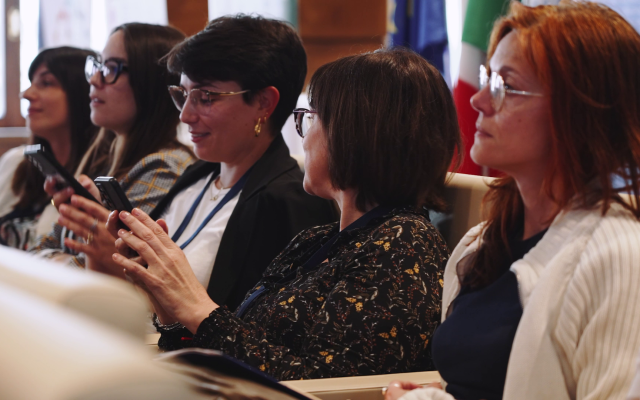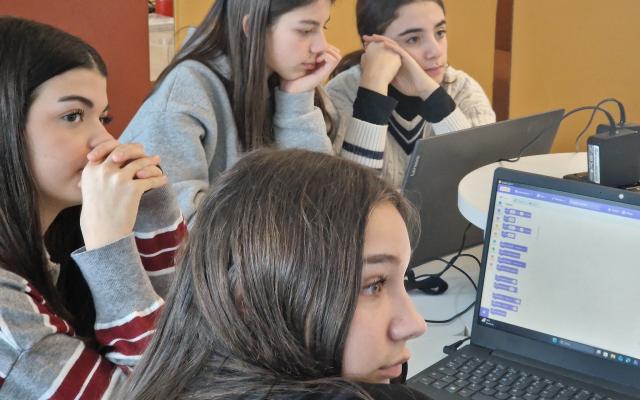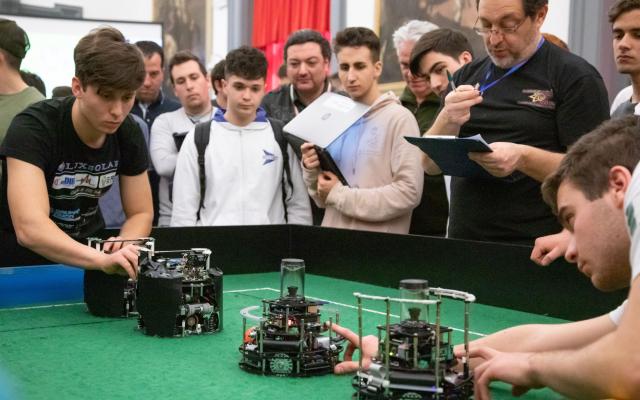A report on the first day and the main events scheduled for tomorrow
Technology at the service of the common good and peace, as evoked by Pope Francis (speech at the G7, June 2024). The commitment of the scientific community and institutions to redefine common values to address the ethical and social challenges of our ‘techno-human condition’, to promote holistic well-being that includes all people and local communities, in accordance with the Sustainable Development Goals. This was the message that emerged from the debate that animated the inaugural conference of the RomeCup 2025, held in the capital from 7 to 9 May, with a reflection on Pope Francis' legacy on ethics and artificial intelligence.
Voices from the debate:
- Massimiliano Fiorucci, rector of Roma Tre University: ‘The themes of RomeCup 2025 – human and artificial intelligence as challenges for holistic well-being – no longer represent the future, but the present. Our commitment must aim to combat gender gaps, such as male predominance in STEM disciplines, balancing this disparity with greater appreciation of women in science. Let the RomeCup be an opportunity to truly put humanity at the centre."
- Mirta Michilli, Director General of the Fondazione Mondo Digitale: ’RomeCup is much more than an event: it is a platform of possibilities, an accelerator of trust, a living map of new educational needs and emerging social opportunities. It is the place where technology and humanity meet, not to compete, but to build together. We have chosen to open this edition with a profound reflection by Pope Francis. In a time marked by growing inequalities and educational loneliness, we believe that innovation must serve to connect, not divide. To include, not exclude. To build communities, not just skills."
- Ennio Chiatante, IFR delegate for Europe: ‘The application of artificial intelligence in robotics allows robots to adapt and intervene in less structured environments, bringing the capabilities of machines ever closer to human needs. The machine adapts, interprets and evolves. But human beings remain the most versatile machines we know’.
- Gianluigi Greco, president of AI*IA: ‘We must train our ability to coexist with these technologies by developing a critical spirit. Ethics requires an understanding of the new world. Hard skills alone are not enough: we must exercise two essential skills, knowing how to ask questions and contextualise. Our language skills are also fundamental: without them, we risk losing poetry. And we cannot afford to lose another even more precious skill: empathy."
- Seydina Moussa Ndiaye, UN AI Advisory Group: ’We have a collective responsibility to ensure that the innovation process follows principles of ethics and sustainability. The RomeCup, in this sense, is a real call to action. The UN Advisory Board on Artificial Intelligence, of which I am a member, was created to reflect on AI governance based on human rights, inclusion and sustainability. Our recommendations were published in the 2024 report ‘Governing AI for Humanity’, so that artificial intelligence can become a lever for shared progress."
- Andrea Orlandini, CNR researcher: ‘Technological developments present us with major challenges. The most appropriate approach remains a scientific one, investing in research that looks at these phenomena from multiple angles, not just the technological one. It is essential that the younger generations understand the sensitivity of these issues, deconstructing the myth of general AI. We have a responsibility to make conscious and sustainable use of these technologies.‘
- Giorgio Resta, full professor of Comparative Private Law at Roma Tre University: “Stefano Rodotà quoted Hegel: rules arrive late in relation to technological acceleration, ”at dusk’. In German, ‘power’ is expressed with two words that mean ‘we can’ and ‘we are authorised’. This is the challenge facing the law. The European Union's approach to new technologies marks a clear path towards democracy, the rule of law, health and dignity."
- Alessandra Sciutti, IIT researcher: ‘The real challenge today is to develop the capacity for generalisation. These models of artificial intelligence are a mirror that reflects not only how machine intelligence works, but above all how ours works. This comparison is necessary to truly understand what it means to be human.’
The components of the first day, 7 May: for the Ital.IA Lab project, promoted by Fondazione Mondo Digitale and Microsoft Italia, with the support of Avanade, 50 selected SMEs will compete in teams on solutions to innovate business processes with AI. Microsoft and Avanade have made their AI experts available to guide the SMEs. The winners will be able to participate in an AI Assessment with Microsoft and its partners to evaluate their company's AI readiness. For the ‘Rising Youth’ project, in collaboration with SAP, after a training session on the use of social media for effective business communication, students will present their prototypes to a jury of experts.
The main events on the second day, 8 May, at Roma Tre University:
- ‘Fast Forward AI: from vision to action’: one year after the launch of the Manifesto for collective action on AI and robotics, the signatories meet to give impetus to the inclusive transformation of the country with keynote speeches, working groups and strategic presentations (moderated by Riccardo Luna, 11 a.m., Seminar Room).
- Most Promising Researcher in Robotics and AI Award: now in its third edition, the award grants €20,000 to the best emerging talent (researchers, PhD students) in the field of robotics and AI. With almost 300 applications from over 50 national institutions, the award ceremony will take place in the evocative Sala Esedra of the Capitoline Museums (moderated by Paolo Ottolina, 9 p.m.).
- Secondary school students, guided by illustrator and visual storyteller Fernando Cobelo, will discover how to use creativity and artificial intelligence with awareness. The initiative is part of the ‘Roll Cloud. Working on the Cloud', in collaboration with Opening Future, a joint project by Google Cloud, Intesa Sanpaolo and TIM Enterprise (9.30 a.m. – 12 p.m., room N5).
- Secondary school students, thanks to the presence of experts and young ethical hackers, will discover the crucial role of cybersecurity in modern society. The initiative is part of the ‘Job Digital Lab’ project, in collaboration with ING Italia (9.30 a.m. – 1 p.m., room N11).
- Workshop to explore a preview of the learning platform equipped with intelligent tutoring to support caregivers (teachers, parents and other support figures) and children and young people with special educational needs. The initiative is part of the ‘Pathway Companion’ project, in collaboration with Google.org, Fondazione Don Gnocchi, IT Logix and Roma Tre University (10 a.m. – 12 p.m., room N14 A).
- The winning team of the HealthBot contest will be awarded during RomeCup 2025. Teams of secondary school students will present artificial intelligence solutions for health. The initiative is part of the ‘Fattore J’ project, in collaboration with Johnson&Johnson (11 a.m. – 12.30 p.m., room N6).




